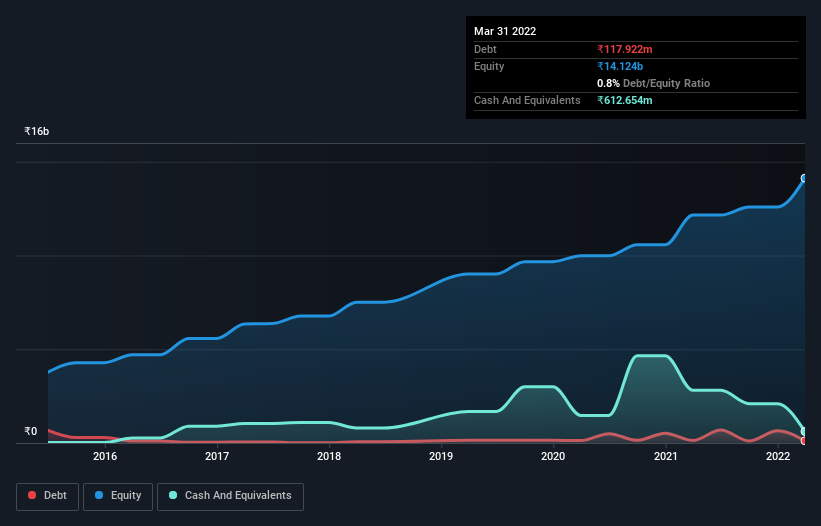
Howard Marks put it nicely when he said that, rather than worrying about share price volatility, 'The possibility of permanent loss is the risk I worry about... and every practical investor I know worries about.' So it might be obvious that you need to consider debt, when you think about how risky any given stock is, because too much debt can sink a company. Importantly, V-Guard Industries Limited (NSE:VGUARD) does carry debt. But the more important question is: how much risk is that debt creating?
When Is Debt A Problem?
Generally speaking, debt only becomes a real problem when a company can't easily pay it off, either by raising capital or with its own cash flow. Part and parcel of capitalism is the process of 'creative destruction' where failed businesses are mercilessly liquidated by their bankers. However, a more common (but still painful) scenario is that it has to raise new equity capital at a low price, thus permanently diluting shareholders. Of course, plenty of companies use debt to fund growth, without any negative consequences. The first step when considering a company's debt levels is to consider its cash and debt together.
View our latest analysis for V-Guard Industries
What Is V-Guard Industries's Net Debt?
The image below, which you can click on for greater detail, shows that V-Guard Industries had debt of ₹117.9m at the end of March 2022, a reduction from ₹130.1m over a year. However, its balance sheet shows it holds ₹612.7m in cash, so it actually has ₹494.7m net cash.

How Healthy Is V-Guard Industries' Balance Sheet?
According to the last reported balance sheet, V-Guard Industries had liabilities of ₹6.16b due within 12 months, and liabilities of ₹678.0m due beyond 12 months. Offsetting these obligations, it had cash of ₹612.7m as well as receivables valued at ₹4.86b due within 12 months. So its liabilities total ₹1.37b more than the combination of its cash and short-term receivables.
This state of affairs indicates that V-Guard Industries' balance sheet looks quite solid, as its total liabilities are just about equal to its liquid assets. So it's very unlikely that the ₹93.9b company is short on cash, but still worth keeping an eye on the balance sheet. Despite its noteworthy liabilities, V-Guard Industries boasts net cash, so it's fair to say it does not have a heavy debt load!
The good news is that V-Guard Industries has increased its EBIT by 5.7% over twelve months, which should ease any concerns about debt repayment. There's no doubt that we learn most about debt from the balance sheet. But it is future earnings, more than anything, that will determine V-Guard Industries's ability to maintain a healthy balance sheet going forward. So if you want to see what the professionals think, you might find this free report on analyst profit forecasts to be interesting.
But our final consideration is also important, because a company cannot pay debt with paper profits; it needs cold hard cash. While V-Guard Industries has net cash on its balance sheet, it's still worth taking a look at its ability to convert earnings before interest and tax (EBIT) to free cash flow, to help us understand how quickly it is building (or eroding) that cash balance. In the last three years, V-Guard Industries created free cash flow amounting to 6.1% of its EBIT, an uninspiring performance. That limp level of cash conversion undermines its ability to manage and pay down debt.
Summing up
We could understand if investors are concerned about V-Guard Industries's liabilities, but we can be reassured by the fact it has has net cash of ₹494.7m. On top of that, it increased its EBIT by 5.7% in the last twelve months. So we are not troubled with V-Guard Industries's debt use. When analysing debt levels, the balance sheet is the obvious place to start. But ultimately, every company can contain risks that exist outside of the balance sheet. To that end, you should learn about the 3 warning signs we've spotted with V-Guard Industries (including 1 which is concerning) .
Of course, if you're the type of investor who prefers buying stocks without the burden of debt, then don't hesitate to discover our exclusive list of net cash growth stocks, today.
New: Manage All Your Stock Portfolios in One Place
We've created the ultimate portfolio companion for stock investors, and it's free.
• Connect an unlimited number of Portfolios and see your total in one currency
• Be alerted to new Warning Signs or Risks via email or mobile
• Track the Fair Value of your stocks
Have feedback on this article? Concerned about the content? Get in touch with us directly. Alternatively, email editorial-team (at) simplywallst.com.
This article by Simply Wall St is general in nature. We provide commentary based on historical data and analyst forecasts only using an unbiased methodology and our articles are not intended to be financial advice. It does not constitute a recommendation to buy or sell any stock, and does not take account of your objectives, or your financial situation. We aim to bring you long-term focused analysis driven by fundamental data. Note that our analysis may not factor in the latest price-sensitive company announcements or qualitative material. Simply Wall St has no position in any stocks mentioned.
About NSEI:VGUARD
V-Guard Industries
Manufactures and sells electrical and electronic products in India and internationally.
Excellent balance sheet with proven track record and pays a dividend.
Similar Companies
Market Insights
Community Narratives




